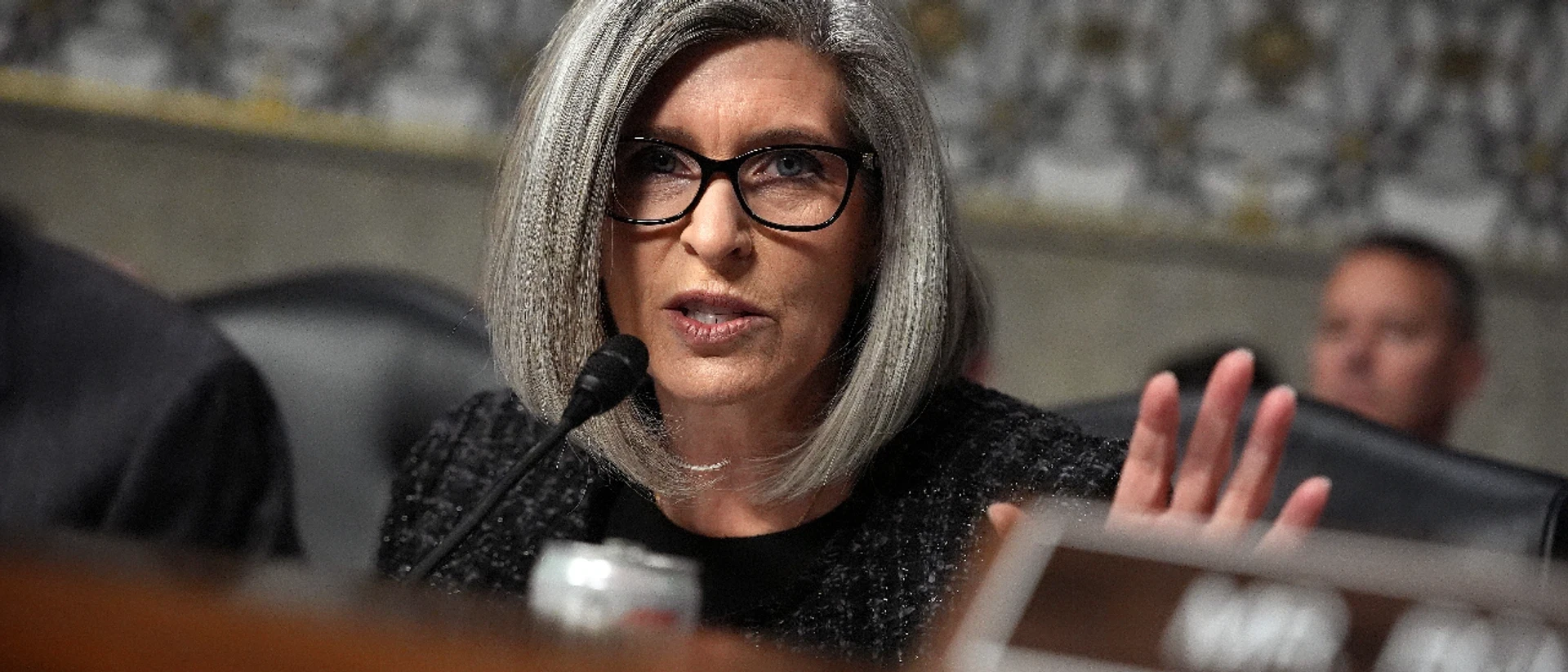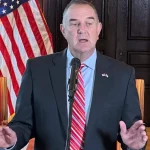In a surprising turn of events, Senator Joni Ernst, the Republican from Iowa, has reportedly decided not to seek reelection in 2026. Multiple sources confirmed the news, sending ripples through both state and national politics. Ernst, who has been a prominent conservative voice in the Senate since 2015, played a central role in shaping Republican messaging on defense, veterans’ affairs, and women’s issues within the GOP.
Her decision opens up a major political battle for her Senate seat in a state that has leaned Republican in recent years but still holds deep electoral significance. As Iowa prepares for this political shift, questions arise about her legacy, the reasons behind her choice, and the implications for both parties heading into a critical election cycle.
Who Is Senator Joni Ernst?
Early Life and Military Background
Joni Ernst, born in Red Oak, Iowa, rose from humble beginnings. She served more than two decades in the Iowa Army National Guard, retiring as a lieutenant colonel. Her military career shaped her political persona, giving her credibility on issues of defense and veterans’ rights.
Rise in Iowa Politics
Before her Senate career, Ernst served in the Iowa State Senate. She gained national attention with her 2014 campaign advertisement titled “Make ’em Squeal,” where she vowed to cut government spending with the same determination she used growing up on a farm castrating pigs. This bold message resonated with voters and propelled her to victory in a tough Republican primary.
Her Senate Career
Sworn in as a U.S. Senator in 2015, Ernst quickly became known for her conservative stances on issues like taxes, agriculture, gun rights, and health care. She was also the first woman elected to the U.S. Senate from Iowa.
Why Senator Ernst’s Decision Matters
Ernst’s announcement not to seek reelection is not just about one Senate seat. It signals a significant shift in Iowa’s political landscape and raises questions about Republican leadership in the state.
Impact on Iowa Politics
- Iowa is a crucial Midwestern state with a strong agricultural base.
- Republicans currently dominate Iowa’s congressional delegation, but an open Senate seat could energize Democrats.
- The decision sets the stage for competitive primaries in both parties.
Impact on National Politics
- The 2026 elections will be critical in determining the balance of power in the U.S. Senate.
- Republicans are already strategizing to maintain control, and losing an incumbent advantage could complicate matters.
- Democrats see Ernst’s departure as a rare opportunity to flip a Republican seat in a red-leaning state.
Possible Reasons Behind the Decision
While Senator Ernst has not publicly detailed her reasons, insiders and political analysts speculate on several possible motivations.
Personal Considerations
Ernst has openly discussed the challenges of balancing family, personal life, and public service. Like many long-serving politicians, she may simply be ready to step back from the constant pressures of Washington.
Shifts in GOP Politics
The Republican Party has undergone major changes since 2015, particularly during and after Donald Trump’s presidency. Ernst often walked a delicate line between supporting Trump’s policies and presenting herself as an independent Iowa voice. The strain of navigating these divisions may have contributed to her decision.
Looking Beyond the Senate
Some speculate that Ernst may pursue roles outside elected office, such as serving in defense policy, veterans’ organizations, or think tanks. Her military background and Senate experience make her a strong candidate for national security or foreign policy positions.
Reactions from Iowa and Washington
Republican Leaders
GOP figures expressed admiration for Ernst’s service while acknowledging the challenge her departure presents. One Iowa Republican strategist noted, “Joni Ernst brought authenticity and grit to the Senate. Replacing her won’t be easy.”
Democratic Leaders
Democrats responded with optimism. A Democratic National Committee official stated, “Senator Ernst’s retirement gives us a chance to connect with Iowa voters who want fresh leadership.”
Public Response
Many Iowans praised Ernst for her service, particularly her work on veterans’ issues. However, others criticized her for aligning too closely with Republican leadership on controversial issues like healthcare and abortion.
Who Could Replace Joni Ernst?
Potential Republican Candidates
- Kim Reynolds, Iowa’s governor, though she may prefer to continue in her executive role.
- Randy Feenstra, a rising conservative figure in Iowa’s congressional delegation.
- Ashley Hinson, another GOP lawmaker with growing recognition.
Potential Democratic Candidates
- Abby Finkenauer, former Democratic congresswoman with strong grassroots support.
- Rita Hart, who previously ran for Congress and has backing among progressives.
- Other local Democratic leaders eager to reestablish influence in Iowa.
The field is wide open, and both parties are expected to pour significant resources into the race.
Senator Ernst’s Legacy
Champion of Veterans and Military
Her military service defined much of her Senate career. She worked to improve healthcare for veterans and pushed for increased defense spending.
Agricultural Advocacy
Representing a heavily agricultural state, Ernst advocated for farmers and rural communities, especially during trade disputes with China that affected Iowa’s soybean and corn exports.
Trailblazer for Women in Politics
As the first woman elected to the Senate from Iowa, Ernst broke barriers and inspired many women to enter politics.
Statistics and Data on Ernst’s Career
- Elected to the U.S. Senate in 2014 with 52% of the vote.
- Reelected in 2020, defeating Democrat Theresa Greenfield with 51.8% of the vote.
- Served as vice chair of the Senate Republican Conference, making her one of the highest-ranking women in GOP leadership.
- Sponsored and co-sponsored over 400 pieces of legislation during her Senate tenure.
Challenges Ernst Faced
Healthcare and the Affordable Care Act
Ernst consistently opposed the Affordable Care Act, aligning with Republican efforts to repeal it. Critics accused her of endangering access to healthcare for low-income Iowans.
Trump-Era Politics
While Ernst supported many of Trump’s policies, she sometimes distanced herself during controversies. This balancing act occasionally alienated both pro-Trump conservatives and moderates.
Abortion and Social Issues
Ernst has been a strong pro-life advocate, which won her support among conservatives but drew sharp criticism from Democrats and women’s rights groups.
Looking Ahead to 2026
The battle for Ernst’s Senate seat is already shaping up to be one of the most closely watched races in the nation. With control of the Senate often hinging on just one or two seats, both Republicans and Democrats will fight fiercely for Iowa.
Political analysts predict record campaign spending, national attention, and intense media coverage as new candidates emerge to take Ernst’s place.
FAQs
Who is Senator Joni Ernst?
Joni Ernst is a Republican Senator from Iowa who first won election in 2014. She is known for her military background and conservative policies.
Why is Senator Ernst not seeking reelection in 2026?
While she has not given detailed reasons, factors include personal considerations, shifts within the Republican Party, and potential opportunities outside the Senate.
What impact will her decision have on Iowa politics?
It opens up a competitive Senate race in a state that Republicans have recently dominated, giving Democrats a new opportunity.
Who are the possible candidates to replace her?
Potential GOP contenders include Kim Reynolds, Randy Feenstra, and Ashley Hinson. Democrats may run Abby Finkenauer or Rita Hart.
What is Senator Ernst’s legacy?
She is remembered as Iowa’s first female senator, a military veteran, and a strong advocate for agriculture and veterans’ affairs.
Conclusion
Senator Joni Ernst’s decision not to seek reelection in 2026 marks the end of a significant chapter in Iowa’s political history. Her departure leaves a wide-open Senate race that could alter the balance of power in Washington.
As Iowa gears up for this political battle, Ernst’s legacy as a trailblazing military veteran, advocate for agriculture, and conservative leader will continue to shape the conversation. Her exit reminds the nation that even seasoned political figures eventually pass the torch — and the fight for Iowa’s future is only just beginning.












